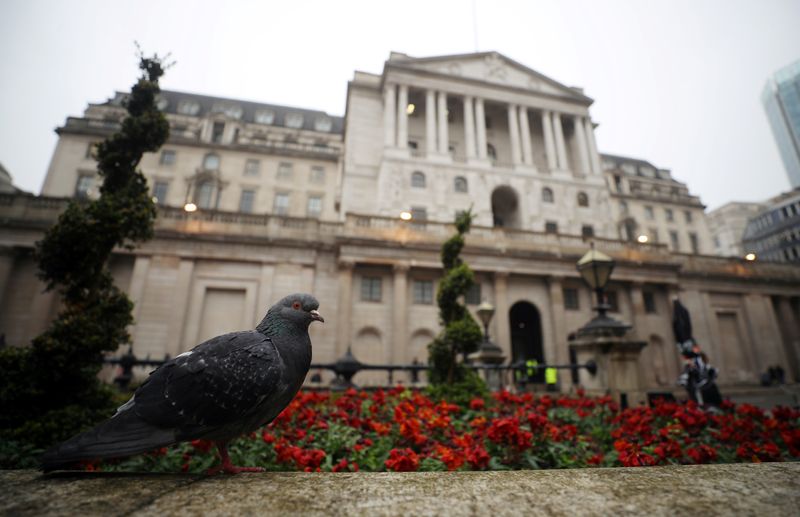By Andy Bruce and Iain Withers
LONDON (Reuters) - Heavy caveats and caution are likely to couch any Bank of England announcement next week that negative interest rates are technically possible in Britain, judging from feedback from major banks.
Alongside its decisions on rates and its bond-buying programme - which are expected to remain on hold - the BoE is due to publish on Feb. 4 the findings of a consultation with banks on what negative rates would mean for their operations.
The BoE has run short of firepower after cutting its Bank Rate to 0.1% and doubling its bond stockpile to nearly 900 billion pounds ($1.23 trillion) to combat the historic economic hit of COVID-19.
So it is looking at the option of following the European Central Bank and the Bank of Japan by using sub-zero rates.
Policymakers are divided about whether the hit to profits at Britain's banking sector would make negative rates counterproductive for the economy, and bankers say updating their systems to cope with a BoE minus figure would be a challenge.
"If negative rates happened tomorrow you would see something clunky but effective from banks, but it wouldn't be great," a senior banker said. "Some of the systems could be adapted very quickly but not all. It is something we take very seriously."
"The industry view is it would take up to a year to be ready operationally," another banker said. "It's incredibly complicated to do and nobody has really planned or budgeted for it."
Lenders in Britain make most of their profits from the difference between the rates they charge for their lending and what they pay for deposits.
"Negative rates would absolutely hit our business models. There's no way we could outrun negative rates," the first banker said.
"The question is: would it finally mean charging for current accounts? It would open the door for it. If someone does it, everyone else will move very quickly."
HSBC said in October that rock-bottom and sub-zero rates in countries where it operates meant it had to consider more fees.
British lenders would probably charge large corporate depositors first and consumers as a last resort.
In Switzerland, big banks initially did not pass negative rates on to private and smaller corporate clients. But five years on, nearly all Swiss banks have passed on some charges to corporate and individual customers with large cash balances.
RECOVERY PROSPECTS
Most economists polled by Reuters think the BoE is unlikely to cut rates below zero this year, largely because the fast rollout of Britain's vaccination programme has raised the prospect of an economic recovery. [ECILT/GB]
Divisions over negative rates among the nine members of the Monetary Policy Committee has also made investors scale back their bets on a cut below zero.
The MPC's five internal members, headed by Governor Andrew Bailey, have stressed risks and uncertainties.
Bailey said last week that rates close to and below zero changed the "whole calculus of how the banking system works" and "we do not know, with any confidence, how that would work."
The four external members sound more open to the idea.
"We had expected the BoE to reach a positive conclusion in a review to be published next week, but Bailey's comments suggest the BoE could stall for more time - or even say 'no for now'," said JPMorgan (NYSE:JPM) economist Allan Monks.
Investors are also waiting to see if the BoE speeds up the pace of its bond-buying programme as a response to the third national coronavirus lockdown, which is likely to lead to a cut to the BoE's forecasts for the pace of the recovery this year.

($1 = 0.7308 pounds)